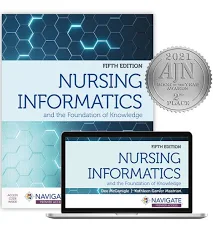
While the project has assisted nurses in demonstrating knowledge and skills in information management and patient care technologies, they are also expected to use the tools at the bedside or organizational levels. Having attended a meeting where a nurse informaticist conducted a presentation on her roles and impact on patient and organizational outcomes, I realized how the role would impact my organization. Drawing from evidence-based literature on the impact of a nurse informaticist on patient care, workflow, costs, and return on investment, the purpose of this paper is to create a proposal for a new nurse informaticist position.
Nursing Informatics and the Nurse Informaticist
The quest for cost-effective and high-quality patient care has resulted in greater integration of technology in healthcare. With the increased incorporation of technologies comes a new challenge: developing a unified definition of the use of technology in healthcare. Because of the lack of a consistent taxonomy, there has been consensus on definitions within healthcare informatics, with each country developing and adopting its own.
All definitions, however, are heavily influenced by the International Medical Informatics Association (IMIA), which defines nursing informatics as a science and a practice that integrates nursing, information communication technologies (ICT), and professional knowledge to promote people’s health (Honey et al., 2022). Honey et al. (2022) state definitions from Australia, the United States, and Canada to gain a common understanding of nursing informatics across diverse geographical contexts.
Nursing informatics is defined by the Australian Nursing and Midwifery Accreditation Council (ANMAC) in Australia as the knowledge and skills required by registered nurses to integrate nursing practice, computer and information science in data management, communication, and decision-making in nursing practice (Honey et al., 2022). In the United States, the American Nurse Association (ANA) Council of Computer Application in Nursing defines nursing informatics as a specialty that integrates nursing science, computer, and information science in the identification, collection, processing, and management of data to support nursing practice (Honey et al., 2022).
According to the Canadian Organization for the Advancement of Computers in Health (COACH), nursing informatics is the use of any information technology by nurses to influence patient care (Honey et al., 2022). Nursing science, ICT, professional knowledge, and the influence on patient care are consistent themes that appear in all definitions of nursing informatics.
With the global implementation of health informatics projects, the nurse informaticist’s role is expanding in various clinical settings. The need for innovative technological solutions to improve care, such as mobile applications, interactive decision aids, web-based technologies, and electronic health records (EHR), broadens the scope of nurse informaticists and gives them a more defining role. According to King et al. (2020), the primary role of a nurse informaticist is to support technological advances that improve patient care, safety, and quality.
Nurse informaticists contribute to such advancements by educating staff on new yet-to-be-implemented technologies, leading quality and process improvement initiatives, and evaluating the impact of technology on care before its implementation. Their education, certification, training, and practice experience position them more appropriately in designing and implementing technological interventions and fulfilling their other scopes of practice.
Nurse Informaticists and Other Healthcare Organizations
Healthcare organizations have had a variety of heartwarming experiences with nurse informaticists. In one case, Billings Clinic, a Magnet-designated non-profit health organization in Montana, northern Wyoming, and the western Dakotas, shares its experience with nurse informaticists. The Billings Clinic Cancer Center serves over 1800 patients annually and
